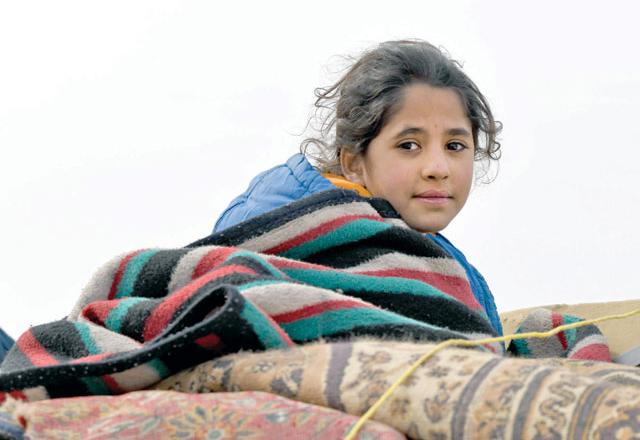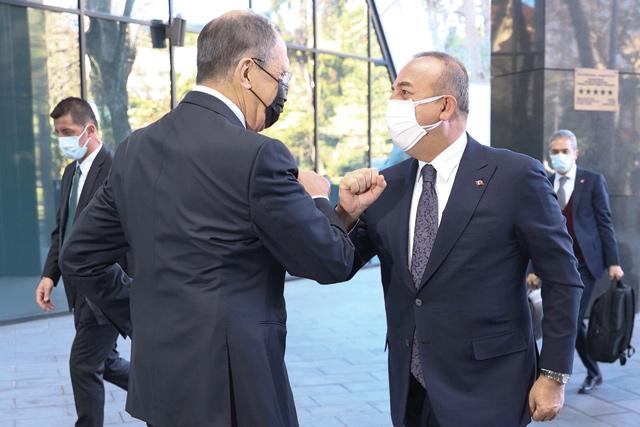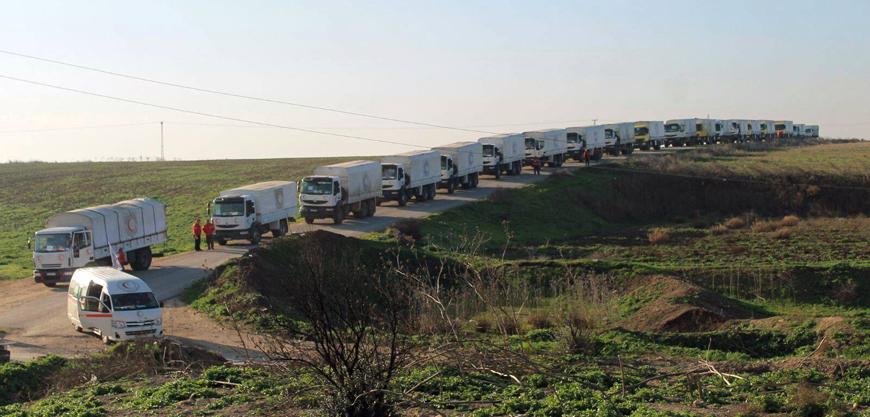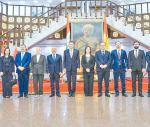You are here
Syria truce hopes dim as Russia is sceptical, fighting rages
By AP - Feb 13,2016 - Last updated at Feb 13,2016
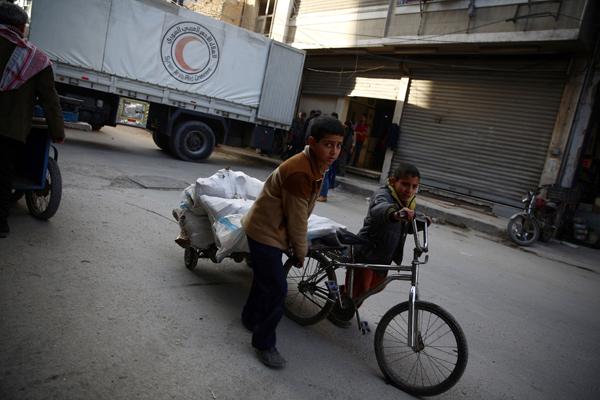
Syrian boys pull a cart in front of a lorry of the Syrian Arab Red Crescent containing aid parcels on Saturday in the rebel-held city of Douma, northeast of the capital Damascus (AFP photo)
MUNICH — Hopes of securing a temporary truce in Syria within a week dimmed on Saturday as Syrian government forces tightened the noose around rebel-held parts of Aleppo and Russia's foreign minister put the chances of a quick truce at less than 50 per cent. His comments and strong words from US Secretary of State John Kerry underscored deep US-Russian disagreements over Syria.
Further complicating the picture, Turkey's foreign minister said his country and Saudi Arabia may launch ground operations against the Daesh terror group in Syria, Turkish media reported on Saturday.
Diplomats from countries with interests in Syria's five-year civil war — including the United States, Russia, Turkey, Iran and Saudi Arabia — agreed on Friday to work towards a temporary "cessation of hostilities" within a week. They also agreed to "accelerate and expand" deliveries of humanitarian aid to besieged Syrian communities beginning this week.
Still, officials acknowledged from the start that the test would be turning commitments on paper into reality on the ground — and it wasn't clear whether deep differences regarding the truce and which groups would be eligible for it could be overcome.
The truce deal in Munich came as Syrian government forces, aided by a Russian bombing campaign, are trying to encircle rebels in Aleppo, the country's largest city, and cut off their supply route to Turkey.
Speaking Saturday at the Munich Security Conference, Russian Foreign Minister Sergey Lavrov — pressed to say how confident he is that a "cessation of hostilities" will be implemented within a week — replied: "49" out of 100 per cent. He indicated that Russia remains deeply suspicious of US intentions.
Lavrov said everyday military cooperation between the US and Russia in particular is "the key tool" to ensuring the delivery of humanitarian supplies and an end to hostilities in Syria. But he complained that coordination hasn't gone beyond an agreement to avoid in-air accidents.
"If we are moving closer to practical goals of [a] truce, then without cooperation between the military nothing will work out," Lavrov said.
Lavrov said comments by US officials raised the impression that their aim was to stop Russia's military operation in Syria while the US-led coalition's continues — "although we are fighting the very same... organisations which the UN Security Council has designated as terrorist organisations".
US Secretary of State John Kerry, who negotiated the deal with Lavrov and others, said after Lavrov's pessimistic assessment about the proposed truce that "we will, we will make it work".
Still, Kerry's address earlier Saturday to the Munich conference underscored the persistent tensions between Russia and the West over Syria.
He repeated allegations that Russian air strikes in Syria have not been directed at terrorists but rather at moderate opposition groups supported by the US, and its European and Arab partners. Kerry also said Russia would have to change tactics if the agreement for a temporary truce in Syria is to actually take effect in the planned timeframe.
"To date, the vast majority, in our opinion, of Russia's attacks have been against legitimate opposition groups. And to adhere to the agreement it made, we think it is critical that Russia's targeting change," Kerry said. "If people who want to be part of the conversation are being bombed, we're not going to have much of a process."
The opposition "may be pushed back here and there, but they are not going to surrender", Kerry said.
The State Department said Kerry and Lavrov met again on Saturday afternoon to go over plans for a task force to work out the details for the truce and also briefly discussed the organisation of a second task force to coordinate humanitarian aid.
It remains unclear whether fighters in Syria will adhere to a truce. On Saturday, Syrian government forces captured another village near Aleppo.
State TV and an opposition activist group, the Britain-based Syrian Observatory for Human Rights, said troops captured Tamoura on Saturday amid intense shelling and air strikes by Russian warplanes. Syrian government troops still have to take several more villages and towns, including Hayan, Anadan, Hreitan and Kfar Hamra, in order to completely encircle the Aleppo rebels.
Hizbollah-run Al Manar TV said government troops are now overlooking Hayan and parts of Anadan. The Lebanese Shiite group is fighting alongside forces loyal to Syrian President Bashar Assad.
Syria's war has killed 250,000 people, wounded more than a million and displaced half the country's population. A half-million Syrians were among the 1 million refugees who flowed into Europe last year in the biggest migration the continent has seen since World War II. Neighbouring Turkey is hosting at least 2.5 million refugees from Syria.
Turkey's foreign minister, Mevlut Cavusoglu, was quoted in the Yeni Safak newspaper Saturday as saying that "Turkey and Saudi Arabia may launch an operation from the land" against Daesh, which holds a swathe of Syrian territory.
Saudi Arabia is "ready to send both jets and troops" to Turkey's Incirlik Air Base, Cavusoglu was quoted as saying, and a ground operation is possible if there is "an extensive results-oriented strategy" in the fight against the Islamic extremists. Incirlik is now being used by the US-led coalition in the campaign against Daesh.
Turkish television channels NTV and CNN Turk also carried remarks by Cavusoglu suggesting that Turkey and Saudi Arabia see eye-to-eye on the need for ground operations in Syria.
Related Articles
MUNICH, Germany — Russian Foreign Minister Sergei Lavrov said Saturday that victory over terrorist groups in Idlib was "unavoidable" as Mosc
MOSCOW — Russian Foreign Minister Sergei Lavrov said on Tuesday that Moscow and Ankara's military cooperation would not be deterred by US sa
WASHINGTON — The United States is coming under increasingly bitter criticism for its perceived lack of leadership over Syria as the country'


